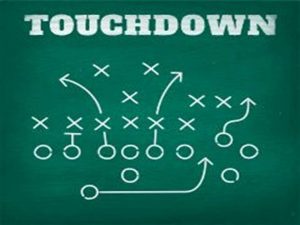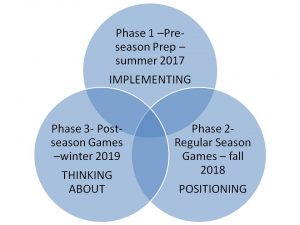by Peter A. Arthur-Smith, Leadership Solutions, Inc.®
“Conformity is the jailer of freedom and the enemy of growth” John F. Kennedy.
 |
If Bill Bellichick, the successful Patriot’s Superbowl winning coach in 2017, were to decide to replicate this year’s Superbowl victory in Houston, with the same strategy, his current team orientation and coaching-outfit, he will most likely fail…simply because he would be attempting to conform to a dynamic that cannot be repeated. It’s imperative that he evolve his team and coaching-unit from their recent moment of February glory, to a new level, if they’re going to have a chance of winning again in 2018. This is what Kennedy was implying in his quote: ‘Don’t conform to what you were in 2017 or else you’ll have minimal chance of becoming the victor in 2018.’
Bellichick’s question is then, “How do I go about that?” Many of his players will probably want an easier year, after so much effort in their 2016-17 football season. Many
won’t see themselves going any further in terms of upgrading their skills that much more. Additionally, many on his coaching staff will likely feel the same way. And yet it’s going to require him to raise their sights and repeat their effort, and then some, if they are going to have a shot at winning their next straight Superbowl.
Even if there were a repeat final in 2018 against their worthy opponent this time around – the Falcons – it will do everything possible to annihilate the Patriots at their next opportunity. The Falcons will not expect to falter twice. On top of that, it requires an absolute superhuman motivational effort to win the Superbowl twice in a row. Few teams across the top-drawer athletic spectrum have succeeded with a repeat victory.
So, what does Bellichick do to make the Patriots a serious contender, again? Such a question is what so many successful executives find themselves asking after a super-performance year. How to repeat that performance, again and more, all other things being equal? They normally expect to be utilizing the same winning team members, facing an evolving marketplace or sports environment, knowingly needing enhanced effort, and, more than likely, having the same coaching staff around them. Then there’s a good bet that their competitors or opponents are going to be even more talented, highly motivated, well prepared, and so on. Baseball’s 2016 World Series champions, Chicago Cubs, team coach and executives are being faced with exactly the same challenge. They reveled in their victory: now they have the challenge of repeating it. It’s far more challenging than the wisest thought.
First and foremost, it will require Bellichick to be strategic about it. He can only put himself in contention again, if he has built the right combination of fundamental competencies in and around his team over recent years: otherwise their recent success will collapse like a pack of cards. It’s no good getting his tactical playbooks out and tinkering with them. It will need a fresh look at his strategy, team members, coaching staff, and resource availability; as well as a comprehensive view of likely contenders and where the game of football is trending.
 |
He likely requires a three phase approach:
Phase 1 – Preseason preparation
Phase 2 – Regular season games
Phase 3 – Post-season, Superbowl build-up.
As soon as he returns from his post-Superbowl vacation, he will be implementing Phase 1. Simultaneously, he will be putting the right things in place – known as positioning – for Phase 2. Again, simultaneously, he will already be ‘thinking about’ Phase 3. In any one week, after his return, he will probably devote 50% of his time (20 of a 40 hour week) on addressing Phase 1, 35% of his weekly time (14 hrs) in positioning for Phase 2, and 15% of his weekly time (6 hrs) on “thinking about” Phase 3. (NOTE: These time allocations have to more-or-less be worked into each regular week.) He needs to keep reminding himself of the ultimate prize and, to some extent, his players and coaching staff. He shouldn’t be obsessing with his players or coaches about Phase 3 until the Superbowl is within sight.
Eventually, when Phase 2 arrives, he will now switch that into implementation mode and raise his attention up to 20 hours a week. At that point, Phase 3 – thinking about, slips into the positioning mode at 14 hours per week. The former Phase 1, 2017 implementation mode, is now pushed off to preseason-preparation of their subsequent 2018 season, and moves into the “thinking” mode at 6 hours a week. This cycle then works its way through until Phase 3 arrives at the implementation mode in early 2019, Phase 1 (2019) then reaches the positioning mode, and Phase 2 (2019) enters into the thinking mode.
Now you can begin to see how a strategic cycling/priority streaming approach comes into its own. It suggests an evolving organization, rather than one sputtering from one lock-step mode to the next. Enlightened leaders are working at three different levels in any one week – implementing, positioning and “thinking about.” Just think about how this contrasts to our traditional approach: where we become preoccupied with conceiving, then move to preparing and then to implementing – one lock-step after the other and a real time waster.
It’s rather the same in the building-construction business, where you go through the whole planning cycle, then move into the contracting phase, and finally reach the construction phase. Many US States are now combining the planning, contracting and construction phases; which means that buildings are built much quicker and without the enormous overhead of including middle-men in the exclusive arrangements of the past lock-step approach.
Future organization behavior, in accord with our suggested strategic cycling or priority streaming mode, requires more of a leader than a manager personality. Managers are much better suited toward the implementation phase, while leaders are much more in their element with the positioning and “thinking about” phases. Such behavior correlates well to the definition – Managers are systems and process thinkers, while leaders are people and progress thinkers. We need both.
Hence if Bellichick’s Patriots are going to be real Superbowl contenders in 2018, he has to really show his leadership mettle over the next 12 months. It’s more than likely he has that disposition, based upon his five Superbowl victories until now… pretty much more than any other coach. He then has to ensure that he has the right leader-manager combination around him to raise the Patriots’ team sights and effort so as to become a real contender once more.
Do you have the same leader capability to work concurrently with implementing, positioning and thinking about within your current organization? Are you able to be a strategic cycler-priority streamer? Once you have things rolling, you then have the challenge of getting everyone else to jump on board. If they’re leaders, they can assist with the positioning and “thinking about” phases – with appropriate involvement on the implementation phase. If they’re natural managers, they will feel much more at home with your implementation activities. Take a close look and move forward accordingly.
Traditionalists “jail the freedom” to move forward by conforming to the same outdated tools of strategic and operational planning. Futurists are the “friends of growth” through the use of groundbreaking tools like Strategic Positioning or Frameworks. Enlightened momentum building relies on these latter principles and practices.
To learn more about “being friends of growth”, talk with:
